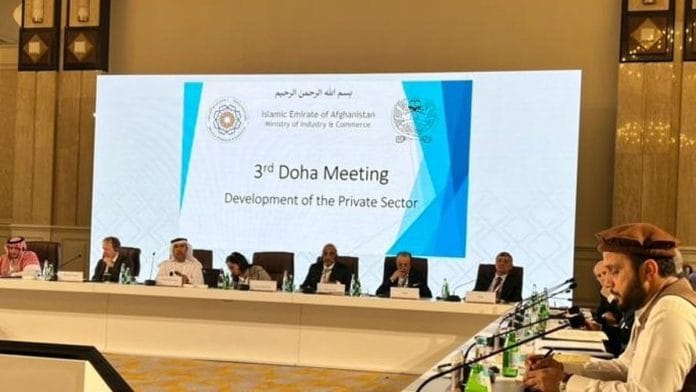New Delhi: The Taliban is for the first time participating in a United Nations (UN)-led meeting in Qatar’s Doha that started Sunday, sparking an outcry from women’s rights activists across the world.
Interestingly, an Indian delegation led by senior diplomat J.P. Singh, who heads the Ministry of External Affairs’ (MEA’s) Pakistan, Afghanistan and Iran (PAI) Division, met Taliban representatives ahead of the meeting.
There was an “exchange of views on the development of relations between the two countries”, during which India supported the Taliban’s position in the Doha meeting and in turn, thanks were given for India’s assistance to Afghanistan, according to a statement issued by the Taliban government spokesperson.
The war-torn country’s economy and impact of Western sanctions featured prominently during the UN-led meeting on Afghanistan, where discussions also focused on the threat of drugs and other issues. Taliban government spokesperson Zabihullah Mujahid noted that the regime’s ban on poppy cultivation failed to garner any movement in terms of easing of sanctions by the international community.
Incidentally, External Affairs Minister S Jaishankar visited Doha a day before the UN meeting, where he held talks with Qatari Prime Minister Sheikh Mohammed bin Abdulrahman bin Jassim Al Thani. This was Jaishankar’s third visit overseas and second to West Asia, since assuming office for a second time earlier in June.
Ahead of the UN meeting, the Taliban held talks with diplomatic delegations from Uzbekistan, Russia and Saudi Arabia. According to a statement from the Taliban, Riyadh wants to reopen its embassy in Kabul “as soon as possible”.
The Taliban continues to be economically crippled under the UN and Western countries, and all foreign reserves of Afghanistan’s central bank remain frozen. However, certain players in its neighbourhood like Kazakhstan have removed the Taliban from their list of prohibited groups.
The Russian foreign ministry is reportedly considering the same. China, meanwhile, became the first country to officially recognise an ambassador appointed by the Taliban regime this February.
Also Read: Book on Kabul busts myths about Taliban. ‘Gripping account’ by former journalist of ThePrint
Taliban’s ‘economic orientation’
While delivering a speech at the UN-led meeting in Doha Monday, the Taliban spokesperson said “economic orientation” is at the heart of the regime’s foreign policy.
“We appreciate the countries that provide humanitarian aid, however, the main solution to the economic obstacles of Afghans is to remove unilateral and multilateral sanctions…,” he said.
He further said, “With our economically oriented foreign policy, we have been able to provide connectivity to the region through Afghanistan. With the construction of the transportation railway from Uzbekistan to Afghanistan in the north, Central Asia will be connected with South Asia. Our respective entities are working closely with our Uzbek and Pakistani counterparts.”
Last July, a joint protocol for the ‘Trans-Afghan project’ was signed in Islamabad. This envisioned 700-km railway line seeks to connect Uzbekistan’s and Pakistan’s railway networks through Afghanistan. Though progress has been slow, it is estimated to be completed by 2027. Other regional projects involving Afghanistan, like the Turkmenistan–Afghanistan–Pakistan–India (TAPI) Pipeline, have also faced major snags due to security issues in the region.
“We perceive the current Doha meeting as a crucial opportunity to engage in constructive dialogue regarding the unilateral and multilateral sanctions imposed on some officials and our financial and banking sectors, as well as the broader challenges,” said Taliban’s Mujahid in his speech.
He added: “I do not deny that some countries may have problems with some measures of the Islamic Emirate. I think that policy differences amid states are natural, and it is the duty of experienced diplomats to find ways of interaction and understanding rather than confrontation.”
(Edited by Gitanjali Das)
Also Read: Tensions high after Taliban says it targeted Pakistani troops at Afghanistan border in retaliation







The world should hold the Taliban to solemn assurances they have made. On terrorism. Giving girls and women the freedom to study and work. Developing its mineral resources requires Afghanistan to be at peace with itself.